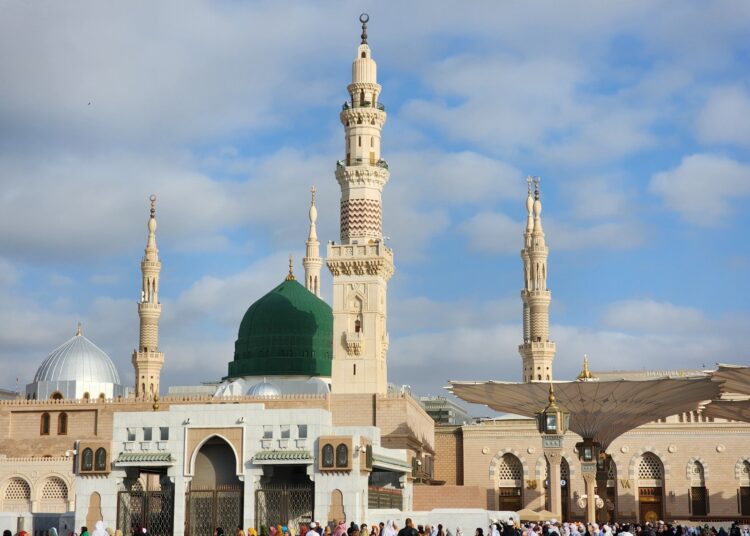As the first light of the year 1447 AH dawns upon us, humanity stands at a profound spiritual threshold. Prophet Muhammad’s migration (Hijrah) marked not merely a physical journey from Makkah to Madinah but a deep inner movement—a migration of the heart—away from disobedience and towards divine obedience. It is an event rich in symbolism, signifying sacrifice, patience, resilience, sincerity, and unwavering trust in Allah. As Muslims around the world prepare to embrace this new Islamic year, it is essential to view this moment not just as a change of date but as an opportunity—a divine invitation to reset our spiritual compass, renew our commitments, and strive toward a higher station of faith and righteousness.
The passing of a year, in the grand scheme of divine wisdom, is a reminder of Allah’s infinite mercy and a chance for self-assessment. The Qur’an commands us: “And establish prayer (Salah), and give zakat, and obey the Messenger (Muhammad Sallallaahu alayhi wa sallam), that you may attain mercy” (Surah Al-Hashr: 18). This verse underscores the fundamental pillars of Islamic practice—the act of worship, charity, and obedience—all vital for a truly meaningful life and for earning Allah’s mercy.
The Significance of the Islamic New Year (Hijri)
The Islamic calendar, based on lunar cycles, provides believers with a rhythm aligned with divine timing. It helps us structure our lives around moments sacred and significant—like Ramadan, Eid, and the Islamic New Year (Hijri). The year 1447 AH marks another chapter in our spiritual journey towards Allah, an occasion to re-evaluate our deeds, intentions, and aspirations. The Hijrah serves as a timeless reminder that life is transient, and true success depends on our readiness for the Hereafter.
The Prophet Sallallaahu alayhi wa sallam’s migration was motivated by the desire for Allah’s pleasure and the establishment of a society based on justice, faith, and righteousness. It teaches us that no matter how difficult the circumstances, steadfastness and sincere reliance on Allah can transform adversity into victory. As Allah states:
“And those who migrated for the sake of Allah after they had been oppressed, We will surely grant them a goodly reward in this world, and the reward of the Hereafter is even greater” (Surah At-Tawbah: 20).
This principle encourages us to embrace our own “migration”—our inner spiritual transformation—start anew, and continue striving regardless of obstacles.
Reflection on the Past Year: Accountability and Self-Examination
As the new Hijri year begins, it obligates us to pause and undertake sincere self-assessment. Allah commands us in the Qur’an: “So, do not weaken and do not grieve, and you will be superior if you are true believers” (Surah Al-Imran: 139). The past year has now become a chapter written — with our deeds, successes, shortcomings, and forgotten opportunities. Are we satisfied with what we have achieved? Have we increased in acts of worship—prayer (Salah), fasting (Sawm), charity (Zakat and Sadaqah), seeking knowledge, and performing good deeds? Or have we become lax, heedless, and distant from Allah’s commands?
It is vital to remember that life is fleeting, and nothing we possess, no matter how great, will accompany us beyond the grave. Prophet Muhammad Sallallaahu alayhi wa sallam said:
“Take advantage of five before five: your youth before old age, your health before sickness, your wealth before poverty, your free time before you are busy, and your life before your death.” (Reported by Al-Hakim, authenticated by Al-Albani)
These blessings are transient opportunities—a test from Allah to be utilised in His service. The responsible believer recognises the importance of gratitude and earnestness, channelling all blessings towards acts that please Allah.
The Value of Inner Migration: From Disobedience to Obedience
The concept of migration (Hijrah), which historically refers to the physical relocation of the Prophet Muhammad (Sallallaahu alayhi wa sallam) from Makkah to Madinah, also signifies an inner spiritual migration. It represents turning away from sinfulness, heedlessness, and disobedience, towards sincere worship, righteousness, and closeness to Allah. It is the most sincere and enduring form of migration, for it involves purifying the heart, realigning one’s intentions, and dedicating oneself wholly to the worship and remembrance of Allah. Allah promises those who undertake this spiritual migration:
“And those who migrated for the sake of Allah after they had been oppressed, We will surely grant them a goodly reward in this world, and the reward of the Hereafter is even greater” (Surah At-Tawbah: 20).
This divine promise is a powerful motivation for us to internalise the lesson of the Hijrah: that global change begins within. Our inner states—our sincerity, humility, patience, and love of Allah—are the true migrations that elevate us to higher stations in the sight of Allah.
Picking Up the Threads of Moral and Social Responsibility
The Prophet Sallallaahu alayhi wa sallam also confirmed the importance of social duties that exemplify our faith: kindness to parents, care for orphans, fairness in business, honesty in speech, and justice in dealings. The Qur’an reminds us:
“Say, Come, I will recite what your Lord has prohibited to you. Do not associate anything with Him; be good to your parents; do not kill your children out of poverty—We will provide for you and them; do not approach immoralities—what is apparent and what is hidden; and do not kill anyone except by right. This has been enjoined upon you that you may understand” (Surah Al-ʿAnkabūt: 31-32).
These commandments are not merely rituals, but the very foundation of a healthy, compassionate, and just society. They teach us to embody the virtues of patience, compassion, honesty, and trust—values necessary for a harmonious and upright community.
Sacred Months and Special Days
The Islamic year, composed of lunar months, contains sacred periods when sins are intensified in their prohibition, and acts of worship are multiplied. The month of Allah—the sacred month—is Muharram, the first month of the Islamic calendar. Its virtue is renowned, especially the Day of Ashuraa—an auspicious day that Allah has blessed, during which fasting expiates the sins of the past year (Muslim, 2:715). The Prophet Sallallaahu alayhi wa sallam said:
“Fasting on the Day of Ashuraa expiates the sins of the past year.”
This beautiful day reminds us of Allah’s mercy and forgiveness, inviting sincere repentance and increased acts of righteousness. It is a clarion call to renew our faith, shed sins, and seek Allah’s pardon.
The Sip of Wisdom from the Qur’an and Sunnah
The Qur’an guides us to reflect on our moral compass and spiritual duties. For instance, Allah commands:
“Say, [O Muhammad], ‘Come, I will recite what your Lord has prohibited to you. Do not associate anything with Him; be good to your parents; do not kill your children out of poverty—We will provide for you and them; do not approach immoralities—what is apparent and what is hidden; and do not kill anyone except by right. This has been enjoined upon you that you may understand’” (Surah Al-ʿAnkabūt: 31-32).
This encapsulates core value principles—divine monotheism, kindness, justice, morality, and honesty—that should shape our lives in this new year.
The Prophet Sallallaahu alayhi wa sallam’s teachings, as mentioned above, also emphasise seizing the opportunities before us:
“Take advantage of five before five: your youth before old age, your health before sickness, your wealth before poverty, your free time before you are busy, and your life before your death” (Al-Hakim, authenticated by Al-Albani).
This guidance encourages us to harness every moment for good and to prioritise acts that earn Allah’s pleasure.
The Power of Sincerity and Repentance
One of the most significant opportunities the new Islamic year offers is sincere repentance (Taubah). The doors of Allah’s mercy are open wide—He loves those who turn to Him in humility. The Prophet Sallallaahu alayhi wa sallam said:
“The best of people are those who, when they sin, seek forgiveness.”
He also said:
“Every son of Adam commits wrong, and the best of those who sin are those who repent.” (Tirmidhi).
Let us use this blessed moment to forgive ourselves, forgive others, and purify our hearts.





